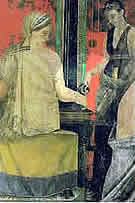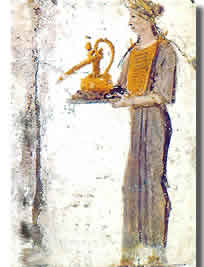| |||||||||||||||||||||||||||||||||
| Facts > Pagan Ideas > Eucharist | ||||
| Christians share a sacred meal with their God—Pagans did it first |

I
sit with Gods at their celestial feast." Was Christianity new? Was Christianity unique? Let's talk about the venerable Pagan sacrament of the sacred meal shared with the Gods. I guess you know about экскурсия в оружейную палату the Christian Eucharist, right?—the Lord's Supper. It commemorates the supper Jesus had with his disciples the night before the Romans nabbed Him and dragged him off, eventually to be crucified. Right? Christians still reenact that meal with Jesus, the meal with the God Jesus. You know this. Some Christians believe the meal is the body and blood of Jesus. What you maybe didn't know is that Mithras' faithful celebrated a sacred meal with their God. So did followers of Adonis, Attis, Osiris, and other Pagan Gods of the Mystery Religions. New members of the Mysteries of Isis and Osiris completed their initiation with a sacramental meal. |
||||||||
Don't worry about Leucippe, by the way. Later on she rises from the dead. That also happened a lot in ancient novels. But you already knew that, right? 'Cause they told you in church. |
|
|
|
Here's how the Catholic Encyclopedia describes the Pagan Eucharists of the Mystery Religions > |
" There
was usually the meal of mystic foods— |
Christians share a sacred meal with their God—Pagans did it first |
|
The Romans' Lectisternia A lectisternia was a sacred meal in which an icon of the God was actually brought to the table with the celebrants. In Rome the whole Senate celebrated a sacred meal, with a statue of Jupiter lying on a cushion, and the two goddesses Juno and Minerva in chairs beside him. |
Dating
lectisternia From the start of the third century B.C. the banquet was regularly given to the three Capitoline divinities, Jupiter, Juno and Minerva on November 13th. During the Empire, the date changed to September13th. Which Gods? |
|||
|
|
|
|
Christians share a sacred meal with their God—Pagans did it first |
|
The next time you're in Church
You'll know you're hearing about theology that predated Christianity by hundreds of years—in a culture where over and over people built new religions out of old parts. Wow! |
| The
Greeks' Theoxenia The Romans got the idea for their lectisternia from the theoxenia at Delphi. Ancient carvings of the ritual show a meal spread out on a banquet table, with the Gods attending. |
But
if he is one of the immortals
come down from heaven, then is this some new thing which the gods are
planning; for ever heretofore have they been wont to appear to us in
manifest form, when we sacrifice to them glorious hecatombs, and they
feast among us, sitting even where
we sit. |
|
Christians share a sacred meal with their God—Pagans did it first |
| Eating
the Flesh of the God his followers believe >
|
"he was
intercepted and killed," and his murderers, "chopped his members
up into pieces and...devoured them." An event which his worshipers
celebrate in "recurring sacred
rites
celebrated every two years," in which, "They tear a live bull
with their teeth, representing
the cruel banquet at which the God was eaten. " |
Christians eat a sacred meal that is the flesh of their God—but Pagans did it first |
|
||||||||||||||||||||||||||||||
|
The next time you're in Church
You'll know you're celebrating an ancient Pagan ritual that predated Christianity by hundreds of years—in a culture where over and over people built new religions out of old parts. Wow! |


 and
strapped her so by means of pegs fixed in the ground, just as the statuaries
represent Marsyas fixed to the tree ; then he took a sword and
plunging it in about the region of the heart, drew it down to the lower
part of the belly,
and
strapped her so by means of pegs fixed in the ground, just as the statuaries
represent Marsyas fixed to the tree ; then he took a sword and
plunging it in about the region of the heart, drew it down to the lower
part of the belly, 
 When
they get to the part about eating a sacred meal in remembrance of the
God, remember the lectisternia of Jupiter, Juno, Minerva, Vesta,
Ceres, Diana, Venus, Mars, Mercury, Neptune, Volcanus, Apollo, Aesculapius,
Hygia, Isis, Mithras, and Jupiter Dolichenus.
When
they get to the part about eating a sacred meal in remembrance of the
God, remember the lectisternia of Jupiter, Juno, Minerva, Vesta,
Ceres, Diana, Venus, Mars, Mercury, Neptune, Volcanus, Apollo, Aesculapius,
Hygia, Isis, Mithras, and Jupiter Dolichenus. Modern
Scholarship
Modern
Scholarship The
Lord's supper commemoratesJesus' last
meal with his disciples. The wine is
His blood. The bread is His
body. Right?
The
Lord's supper commemoratesJesus' last
meal with his disciples. The wine is
His blood. The bread is His
body. Right? (2)
(2)
 T here
is no reason to assume that the communities
of Syria, for whom the Didache was written, followed
the same eucharistic practice and formulae that are attested in
1 Cor 11:23- 26. This is my body, this is my blood,
etc. Rather, these prayers may well belong to a direct continuation
of the fellowship meal that Jesus celebrated with his disciples
and friends. .
T here
is no reason to assume that the communities
of Syria, for whom the Didache was written, followed
the same eucharistic practice and formulae that are attested in
1 Cor 11:23- 26. This is my body, this is my blood,
etc. Rather, these prayers may well belong to a direct continuation
of the fellowship meal that Jesus celebrated with his disciples
and friends. .